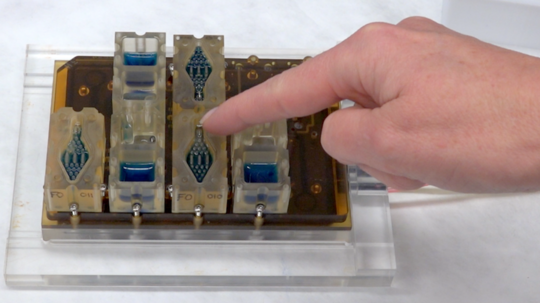
A 3D model of the female reproductive system created by Chicago researchers could pave the way to improved drug delivery and personalized medicine.
The device, called Evatar, is a model of the reproductive system made with human tissue, packed down to the size of a "bento box" according to Northwestern. While it doesn't look like an exact anatomical replica of the reproductive system, the Evatar box contains 3D models of ovaries, fallopian tubes, the uterus, cervix, vagina and liver with a "special fluid" that pumps through the box to simulate blood. The system can simulate a 28 day hormone cycle, producing hormones to prepare for pregnancy, and releasing an egg that travels through fallopian tubes, eventually landing in a uterus model lined with human tissue (though it doesn't bleed like a normal menstrual cycle).
Researchers can use Evatar to test the safety and effectiveness of new drugs on the female reproductive system, as well as do further research on diseases that impact these organs such as endometriosis, fibroids and cancer.
Eventually they hope to use stem cells from patients to create models that simulate how individual patients' bodies will react to various drugs.
“This is nothing short of a revolutionary technology,” said lead investigator Teresa Woodruff, a reproductive scientist and director of the Women’s Health Research Institute at Northwestern University Feinberg School of Medicine, in a statement. Woodruff is working on the project along with researchers from University of Illinois at Chicago and Draper Laboratory, Inc.
“If I had your stem cells and created a heart, liver, lung and an ovary, I could test 10 different drugs at 10 different doses on you and say, ‘Here’s the drug that will help your Alzheimer’s or Parkinson’s or diabetes,’” Woodruff added. “It’s the ultimate personalized medicine, a model of your body for testing drugs.”
This device allows researchers to see how the reproductive organs work together in a "dynamic" setting, rather than seeing how tissues interact in a static setting, such as a petri dish.
“The systems are tremendous for the study of cancer, which often is studied as isolated cells rather than system-wide cells. This is going to change the way we study cancer,” said Joanna Burdette, a professor at UIC who developed Evatar's fallopian tubes.
Research on women's reproductive health is lacking as pregnant women aren’t allowed to participate in new drug studies and women with "child bearing potential" were excluded from clinical studies for several decades.
“This technology will help us look at drug testing and drug discovery in a brand new way,” Woodruff said.
Their research will be published March 28 in Nature Communications.








